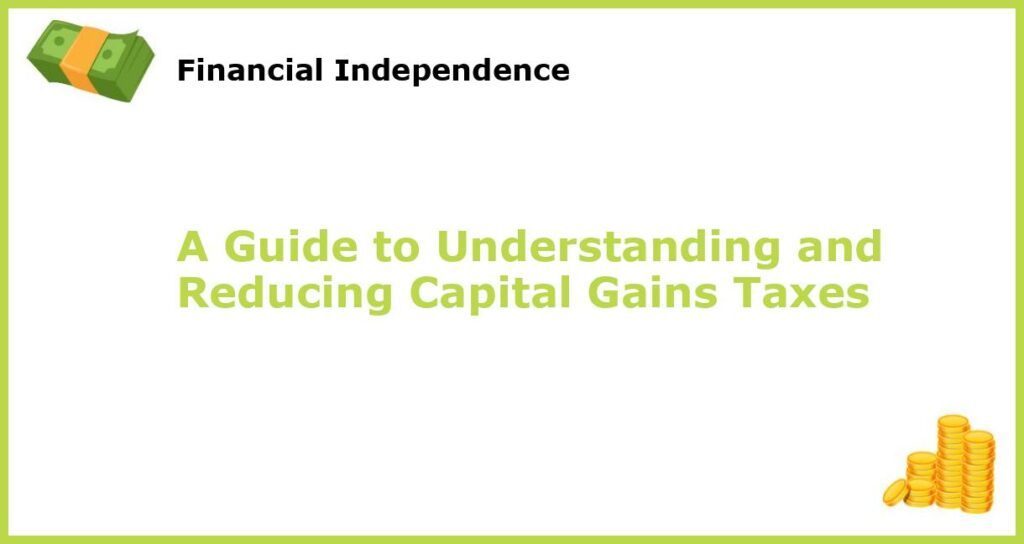The world of taxes can be daunting, especially when it comes to capital gains taxes (CGT). Understanding this type of tax is crucial for investors, as it impacts the profit made from the sale of an asset. CGT is levied on various assets such as property, shares, bonds, or even cryptocurrencies. Once the selling price is subtracted from the cost basis, the profit is then taxed at a specific rate. Reducing capital gains tax liability is an essential aspect of tax planning, which could result in maximized profits, minimized tax liabilities, and a more secure financial future overall.
Long-Term vs Short-Term Capital Gains Taxes

Knowing the holding period of an asset is a critical factor in determining the amount of CGT you’ll pay. Long-term capital gains taxes are applied to assets that you hold onto for longer than one year, and these taxes are generally lower than those for short-term capital gains taxes. Short-term capital gains taxes are applied to assets held for less than one year. It’s worth noting that the duration of holding an asset varies depending on the exact asset, so it’s essential to check the rules that apply to your specific asset.
Investors who are aware of these holding periods are better equipped to manage and plan for their tax liabilities effectively. Holding onto your assets for longer could prove more profitable in the long run since they will incur lower capital gains taxes. Information on how to manage this can be found on the IRS website or in collaboration with a taxation expert.
Tax laws are known to change frequently. Hence it is wise to stay infomed for updated laws, terms, and conditions that will govern your tax liability during the holding period of your assets.
Ways to Reduce Your Capital Gains Tax Liability

Investors can use various tax-efficient strategies to minimise CGT liabilities. One of the most common methods is offsetting capital gains with capital losses. This means that if you have gains from selling an asset exceeding the price you paid for it, then subtracting any capital loss incurred from the same tax year will offset these gains.
Another strategy is deferring capital gains taxes by holding onto the asset for a longer duration. Deciding to donate an asset to charity can be an excellent tax-efficient strategy; this strategy provides a tax deduction reduction while also eliminating the capital gains tax liability – this creates a win-win scenario.
Knowing when to sell an asset or when to hold onto it can help to minimize costs for when a tax-filing date comes around. It is always wise to seek advice from a tax expert when making these tax-running decisions, which could potentially impact your financial future.
Maximizing Tax Efficiency with Retirement Accounts

Retirement accounts allow for more effective minization of capital gains tax liabilities. Accounts such as 401(k)s and IRAs allow you to make contributions that will reduce your annual taxable income. Taxes on any gains will be deferred, with fees applied only when withdrawing the funds or before a specified period’s expiry date, depending on the account type.
With Roth retirement accounts, the contributions are made with after-tax dollars, and the withdrawals, including any gains, become tax-free after a period. This approach ensures better decision-making on the part of investors since the tax fees are deducted in retirement days when more savings mean better financial liquidity.
Capital Gains Taxes and Real Estate

Real estate is a common investment option across the globe, and it is essential to understand the capital gains tax implications of selling a property. Generally, capital gains taxes are applied to the difference between the purchase price and any developments made to the property and the selling price.
A particular tax exemption option is the ‘primary residence exclusion.’ Suppose the property sold was the taxpayer’s primary residence for at least two years consecutively. In that case, up to $250,000 in gains can be excluded from the tax liability. It is critical to understand the tax rules of real estate’s capital gains taxes when dealing with property to guarantee optimal returns.
Tax Benefits of Charitable Giving

Giving to charities provides both charitable and tax benefits. Charitable giving helps in reducing capital gains tax liabilities while donating to causes that you care about. With this strategy, appreciated assets such as stocks or property can be donated, and in doing so, you can avoid paying capital gains taxes while also receiving an income tax deduction for the full market value of the asset.
This strategy is particularly useful for high-income earners and individuals with significant assets who wish to lower their tax burden. It also can help in making a difference in providing an income stream to worthwhile causes that the investment was meant to support.
Timing is Key with Capital Gains Tax

Timing is critical to reducing capital gains tax. By understanding timing guidelines, investors can ensure they’re minimizing tax liability while making the best investment decision. A common rule to be aware of is the “wash sale rule,” which prohibits individuals from selling an asset for a loss and then immediately repurchasing it.
Investors can also manage their capital gains liabilities by selling assets during tax-advantageous seasons. For instance, selling assets with lower tax rates could result in significant tax savings; therefore, planning earnings, particularly high-profit ones, to coincide with tax-compliant months, would prove fruitful.
It’s always best to consult with taxation experts or financial advisers to make the most informed decisions when planning your tax strategy.
Tax-Efficient Investing Strategies
In addition to timing and careful financial coordination, investors can use various tax-managed strategies that can help them minimize their capital gains tax liability. One method is tax-loss harvesting, which generally involves selling assets that have declined in value to offset any capital gains. Another strategy is investing in tax-managed funds that are designed and structed to minimize tax liability and thus offer higher after-tax returns.
Working with a financial advisor or taxation expert can help investors identify the best tax-efficient investment strategies for your specific financial situations. Discussing and planning on proven strategies with taxation and financial experts ensures maximum returns through optimal tax efficiency.
Capital Gains Taxes and Business Owners
Business owners face unique capital gains tax liabilities when it comes to selling their businesses. Owners may want to consider using a Qualified Small Business Stock (QSBS) exemption to reduce tax liabilities. This exemption allows eligible business owners to exclude up to 100% of the capital gains tax from the sale of certain small business stocks.
Another strategy is selling your shares through an installment sale or a Section 1031 exchange. Strategizing the sale date, tax exemptions, and deferral clauses would ensure maximum returns on investment.
Consider the Impact of State Taxes
It is critical to remember that state laws and tax authorities require compliance in reporting and paying their tax expenses. Investors must account for state taxes when considering capital gains tax liability. Many States have higher capital gains tax rates than others, and investors may fail to account for state taxes when calculating their tax liability. This failure to uphold state laws leads to tax penalties and fees.
Working closely with taxation experts guarantees optimal tax returns, whereas ignoring state tax laws will lead to significant financial losses.







